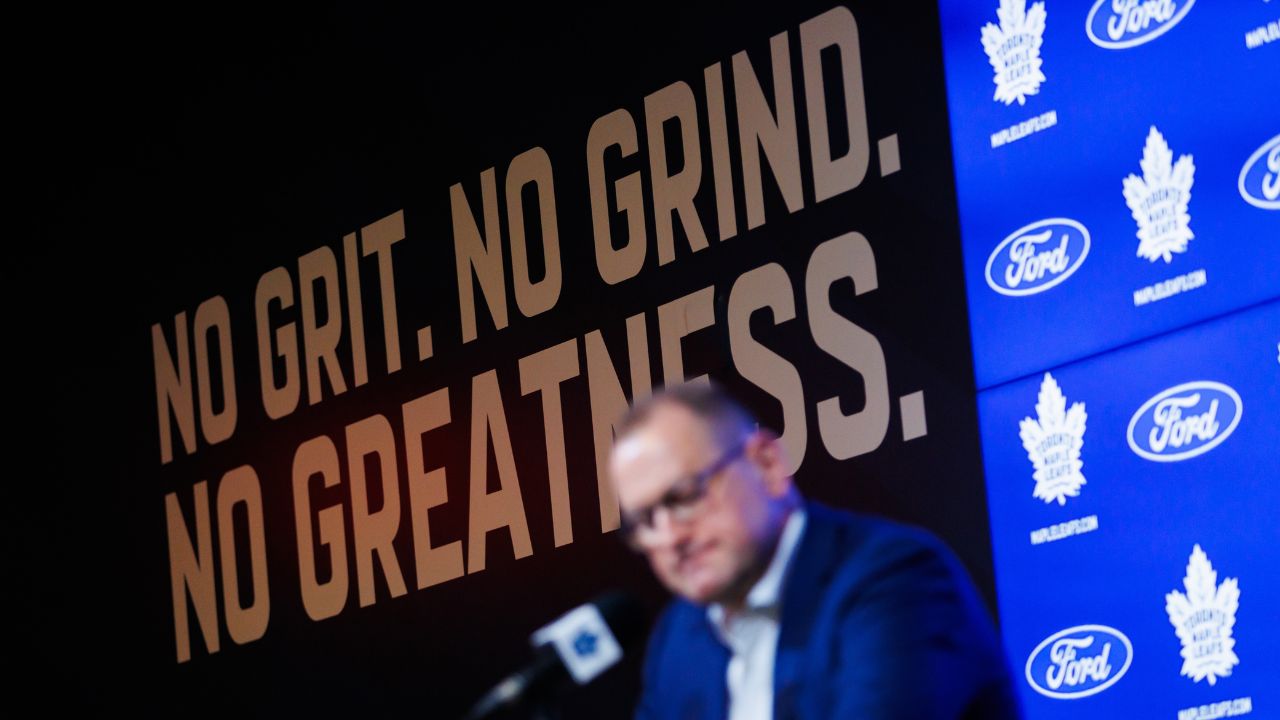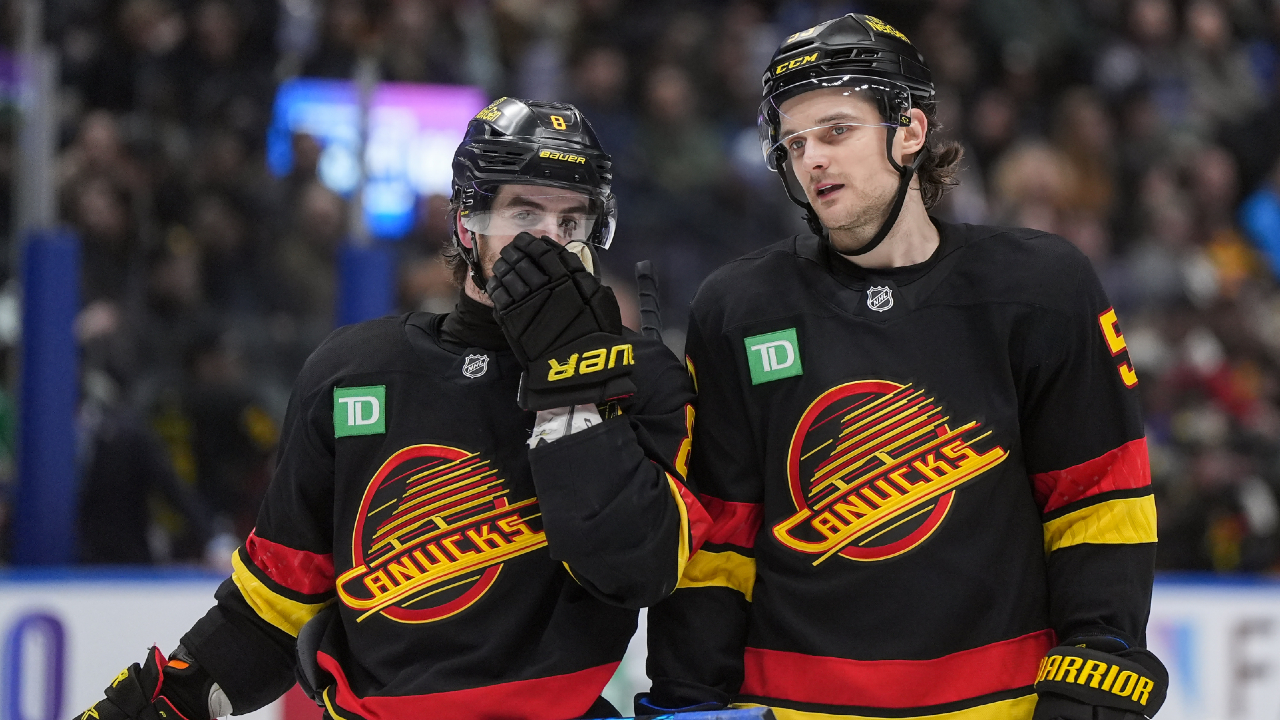
As Brad Treliving sees it, if the Toronto Maple Leafs are to get to the lofty post-season heights its fanbase craves, a fundamental change is needed.
That was the message the Maple Leafs’ general manager delivered Thursday, speaking to the media from the team’s practice facility in Etobicoke, Ont., for the first time since the club’s season came to an end. It was 11 days ago that Toronto’s promising post-season descended into a full-blown Game 7 collapse, a 6-1 rout at the hands of the Florida Panthers — who’ve since booked their ticket to their third straight Stanley Cup Final — that wrapped up with jerseys, beer cans and boos raining down on the ice from the Scotiabank Arena stands.
Having rewatched that season-ending tilt a few times since, Treliving said he felt the Game 7 loss boiled down to more than just X’s and O’s, or missed opportunities.
“It reminded me of a game I was in. I’ve talked to Shane Doan about it,” Treliving said Thursday. “We were in Arizona and we played Detroit in Game 7. We had won an afternoon game in Detroit in Game 6, came back for Game 7. And you’re all fired up for Game 7.
“And one team looked like they were completely comfortable in the situation — the other team didn’t.”
The Maple Leafs were overwhelmed by the Panthers through the opening 10 minutes of their own Game 7 earlier this month, starting on the wrong foot, briefly recovering, but ultimately seeing the night slip away in a seven-minute, second-period collapse.
For Treliving, it was his club’s response to Florida’s first goal, three minutes into that second period, that was most telling.
“I thought we survived,” the GM said of the game’s early going. “I thought they came out, I know the shot attempts and all that stuff were one-sided — I didn’t think we gave up a lot of grade-A stuff. We found our footing, killed a penalty at the end of the first period. Even before that, from the 10-minute mark on, we were carrying play — we had some grade-A chances, we had some breakaways. I thought the turning point was the first goal.
“When the first goal happened, we almost looked like a team that [thought]it was 4-0.”
It’s a criticism not unfamiliar to these Maple Leafs, who’ve seen the unflattering statistics about their lack of success in elimination games brought out each time they’ve faced a new one. For all the regular-season success this era of Maple Leafs hockey has claimed, the struggle to break through in the post-season — to put together the type of deep runs other top-end teams have managed — has largely seemed to come down to a lack of composure in the big moments. An inability, among these Leafs’ best, to rise to those moments, to find the type of legacy-building nights seen on the post-season stage from the Connor McDavids, the Leon Draisaitls, the Nathan MacKinnons.
It was that lack of composure, when the lights were brightest in Game 7, that stood out most to Treliving.
“It’s being able to find your footing,” he continued. “It’s being able to know, as we talk about all the time within a series, you park it and you move on to the next one. There was a tension. I’ll never question the want, the care. These guys want it. They want to be successful. They want to get to where we all want to get to. But at that point, it looked like one team looked more comfortable than the other in the situation.
“You know, there’s more things that we can talk about in the nuances of the game, in terms of our team structure, all that sort of stuff. But from the 10,000-foot view, when it became 1-0, I felt there was a real tightness of our team. There was a real tightness in the moment. Champions are the calmest at the most critical time. And that’s an area that we’ve got to get through.”
The Maple Leafs GM didn’t offer specifics Thursday on how the team will look to shift that mentality and find that missing piece, but Treliving made it clear changes would be coming to his roster.
The most pressing matter on that front is, of course, the pending unrestricted free agency of Mitch Marner — the club is still working through its process to determine whether an offer will be extended to the star winger, Treliving said. Decisions must be made, too, on pending UFAs John Tavares and Steven Lorentz, and RFAs Matthew Knies, Nick Robertson and Pontus Holmberg. Treliving spoke, too, of looking to add more offence to the club’s much-improved defence corps.
What’s clear, though, is that underpinning any changes this off-season will be a focus on bringing more of that champion mindset to the blue-and-white. More of that intangible quality that has seemed to elude this group year after year — the “killer instinct,” the composure, the greatness.
“If you look at that critical moment in Game 7, I don’t care if you’re playing in the Stanley Cup Playoffs, if you’re playing whatever sport, if you’re playing in the Masters — champions have the ability to be calm, and at their very best when it matters the most. And that is an area that we’ve got to improve. … We have to be able to find a way to push through at the most critical moments,” Treliving said Thursday.
“We’ve got to continue to change and evolve our mindset, and we’ve got to find a way to create the team — both between the ears, and personnel — to be our very best at the most critical moments. There’s some DNA that has to change in our team. That’s one thing that I’ve found. … When you keep getting the same result, there’s some DNA that needs to change. So, that’s on me now, going forward.”






